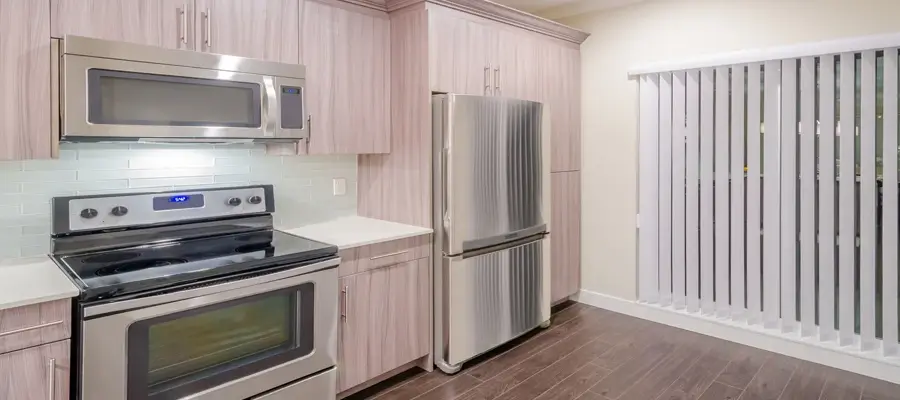When to Repair or Replace an Appliance: Tips to Help You Decide

No appliance lasts forever, not even the uber-expensive ones. Life expectancies are roughly as follows:
- Refrigerators and freezers: ~10-15 years
- Dishwashers: ~8-10 years
- Washing machines and dryers: ~10-12 years
- Ovens and ranges (gas): ~15 years
- Microwaves: ~8 years
If your appliance is nearing or exceeding its average lifespan, replacing it might be more sensible than investing in repeated repairs.
Repairing Your Appliance
But is age the only factor? Not by a long shot. As a general guideline, you should consider repairing an appliance if:
- The issue is minor and easily fixable
- The cost of repairs is significantly lower than the cost of replacement
- The appliance is still under warranty or has extended warranty coverage
- The appliance is relatively new and has not yet reached its average lifespan
Key Factors to Consider
1. Repair Costs vs. Replacement Costs
A good rule of thumb is the 50% rule. If the repair costs more than 50% of the price of a new appliance, it’s usually better to replace it.
- Example: A replacement dishwasher costs $1,000, while repairs to your current unit total $600. Opting for replacement makes more financial sense.
- Get multiple repair quotes before deciding to ensure you’re not overpaying.
2. Energy Efficiency Upgrades
Newer appliances are usually more energy-efficient. Look for ENERGY STAR-certified models that provide significantly more energy savings than non-certified options.
- Example: An old refrigerator may consume up to 1,500 kWh per year, whereas a newer model could use as little as 450 kWh.
3. Availability of Replacement Parts
For older appliances, sourcing parts can be time-consuming and expensive — if they’re available at all. Check whether parts for your appliance model are easily obtainable and reasonably priced.
4. Warranty Coverage
Does your appliance still have a warranty? If so, repair costs may be partially or fully covered, making repair the clear choice. However, if the warranty has expired, weigh the repair costs carefully.
5. Frequency of Failures
If this isn’t the first time your appliance has needed repairs, it might be a sign of more troubles on the way. Frequent breakdowns can strain both your wallet and your patience.
The Pros & Cons of Repairing Appliances
Pros of Repairing
- Cost-effective (in many cases).
- Environmentally friendly — repairing instead of replacing reduces waste.
- Quick turnaround for minor repairs.
Cons of Repairing
- Older appliances may not gain energy efficiency improvements.
- The appliance might fail again soon.
- The cost of repairs could stack up over time.
The Pros & Cons of Replacing Appliances
Pros of Replacing
- Improved energy efficiency, leading to long-term savings.
- Access to updated features and technology.
- Longer lifespan compared to keeping your older unit.
Cons of Replacing
- Higher upfront costs.
- It’s not as environmentally sustainable as repairing.
- Disposal fees for old appliances may apply.
6 Simple Steps to Decide
If you’re still unsure whether to repair or replace your appliance, consider the following:
- Assess the age of the appliance compared to its typical lifespan.
- Check the repair costs against the 50% rule.
- Consider energy savings for a potential replacement.
- Research replacement part availability for the current appliance.
- Weigh the pros and cons of your budget and urgency.
- Consult a professional technician for an expert opinion.
8 FAQs: Repairing or Replacing Appliances
Q: How do I find the age of my appliance?
Check the serial number and model tag, which are often located inside the appliance. The manufacturer’s website can help you decode the age.
Q: How do I choose the right replacement appliance?
Look for ENERGY STAR-certified products, check reviews, and match the size and features to your home’s needs.
Q: Can I repair appliances myself if I’m handy?
Basic issues like clogged filters or faulty plugs can be fixed at home. However, for complex repairs involving electrical components, always hire a professional.
Q: Is it worth repairing a 10-year-old washer or dryer?
It depends on repair costs and the frequency of failures. If repairs are relatively cheap and rare, go ahead, but otherwise, replacing might be smarter.
Q: How can I tell if my appliance is energy-efficient?
Older appliances tend to lack modern energy-saving features. Use a wattage meter or consult the user manual to compare energy usage.
Q: What disposal options are available for old appliances?
Many retailers and municipalities offer trade-in or recycling programs to safely and sustainably dispose of old units.
Q: Are extended warranties worth it for new appliances?
Extended warranties may be worth considering if you’re buying a high-priced appliance. Weigh the additional cost against the likelihood of issues.
Q: Should I repair or replace a stove with uneven burners?
Check the cost of burner replacement and whether parts are still available. Minor burner issues can usually be repaired affordably.
More Articles
0 Comments